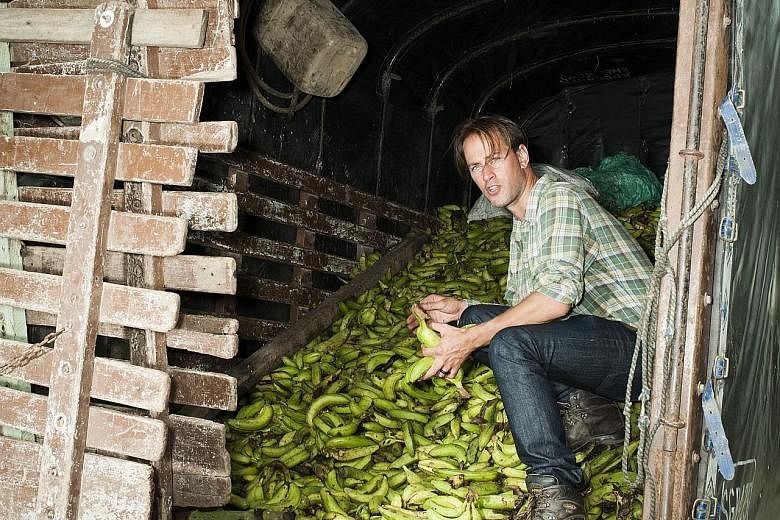8Q
Rearing animals was part of food-waste campaigner Tristram Stuart's growing-up years, but when he realised that buying animal feed for his livestock was pricey and not environmentally friendly, the resourceful lad started hunting for alternatives.
At age 15, he would collect leftover food from his school canteen and lug home sacks of rejected or unsold bread, fruit and vegetables from bakeries and supermarkets.
One day, he chanced upon a sun-dried-tomato loaf while feeding his pigs.
Now 40, the Briton recalls: "I grabbed hold of this particularly tasty-looking bread, sat down and ate breakfast with my pigs. It made me realise how much perfectly good food was being wasted."
That life-changing experience sowed the seeds of his lifelong war against food waste - salvaging the "colossal" amount of consumable food from supermarkets and eateries that would otherwise be discarded and end up in landfills.
He says: "Food wastage is a symptom of a profit-driven food system that shows how badly our natural resources are being managed."
Some reasons behind food wastage include supermarkets rejecting slightly misshapen produce due to cosmetic standards, consumers taking more food than they can consume in buffet lines and the over-estimation of the quantity of food required for corporate events.
Mr Stuart went on to practise freeganism - rummaging for food in supermarket bins - while campaigning against food wastage.
Over the past 15 years, he has exposed food-waste scandals and their grave environmental impact through self-penned books, investigative work on food supply chains and grassroots events.
In 2013, he founded a London-based charity, Feedback, to champion the end of food waste.
One of its annual flagship events is Feeding The 5,000, a public feast made entirely with leftover or unsold food. The event has been replicated in countries such as the United States, France and Italy.
Mr Stuart was in town recently to share about his food-wastage journey as part of National Geographic Live!, a series of events by leading scientists and explorers.
During his maiden trip here, he visited supermarkets and schools and met government officials, representatives from civic societies and retailers to understand what has been done to curb food wastage here and to offer his insights.
According to the National Environment Agency, the amount of food waste here has surged by about 40 per cent in the past decade to 791 million kg last year - equivalent to the weight of 1,420 fully loaded Airbus A380 aeroplanes.
The "strong foodie culture" in Singapore bodes well for Mr Stuart's cause. "Singaporeans spend a lot of money on food and love eating, so there is good reason not to waste it," he says.
During a bin-inspection visit at a FairPrice supermarket outlet, he found boxes of yellow peppers that were "perfectly good to eat".
Last year, he founded a brewery-cum-social enterprise, Toast Ale, which brews beer from surplus loaves of bread.
He believes that taking a celebratory approach is vital in raising awareness of food wastage and changing society's attitudes towards wasting food.
He says with a chuckle: "You don't stop their party, but you prove your point by throwing a bigger party."
1 What excited you most about Singapore's efforts in reducing food wastage?
Upcycling food waste - the idea of turning it into animal feed - is much better than converting it to compost. I was like a boy in a candy shop when I visited the laboratories at Nanyang Technological University.
The scientists there have used a yeast to ferment grain sludge from the beer-brewing process to make it into chicken feed that can be used in farms here. This is a good way of recovering food wastage and turning it into food.
2 What is the biggest problem that Singapore faces when it comes to reducing food wastage?
Most people here know that food wastage is a bad idea, but they do not use their consumer power by voicing their concerns.
They can ask retailers and eateries what they plan to do with the leftover or rejected food and if they are donating them to food charities, and support companies that implement food-wastage-reduction initiatives.
3 What is an interesting practice here on reducing food wastage?
Like in many Asian countries, I like that offal is frequently eaten in Singapore.
Offal consumption in Britain and the United States has halved in the last 30 years.
This is an embedded cultural practice that Westerners can relearn from Asia.
4 Share with us the most devastating food-wastage scene that you have witnessed.
I have been investigating the food-wastage situation in Kenya since 2014.
Half of the vegetables and fruit, which are grown and exported to supermarkets in developed countries, are wasted.
This happens when the produce does not meet the cosmetics specifications of retailers. Some of them cancel or change orders at the last minute. Sometimes, entire fields of produce are not harvested due to these cancellations.
It is criminally shocking that there are mountains of rotting food in a country where millions of people face starvation.
5 What is the biggest misconception people have about food wastage?
People think food is wasted as there is something wrong with it - it has either become mouldy or consuming it may be bad for one's health.
However, most of the food is wasted when it is still perfectly good to eat.
My mum understood what I was doing for the first time when she encountered 20 boxes of ripe organic mangoes that had been discarded. She took five boxes home to make mango chutney.
6 Do you ever waste food?
Sometimes, I get beaten at my own game. At one of my events, I instructed the team to remove the skin and leaves that had sprouted from onions and throw them into the compost bin. An elderly Bulgarian woman said I was crazy to throw the leaves away as they can be used for a salad as these sprouts are as sweet as spring onions.
7 What are the biggest challenges that you face as a food-wastage activist?
One of them is correcting the false assumption of supermarkets that think they are saving costs by taking steps to reduce food wastage.
Their efforts are wasted when they spend more money to maintain a visual display of an abundance of food in their premises that customers are wired to accept.
Another challenge is getting brands to curb wastage even if it does not bring them direct savings. They will lose money in the long run as their public image will suffer if they continue wasting food.
8 How would you like to be remembered?
I would like to be remembered as a part of the global citizenry who have used our power to save the planet from destruction.
•For more tips and information on reducing food wastage, go to www.cgs.sg


